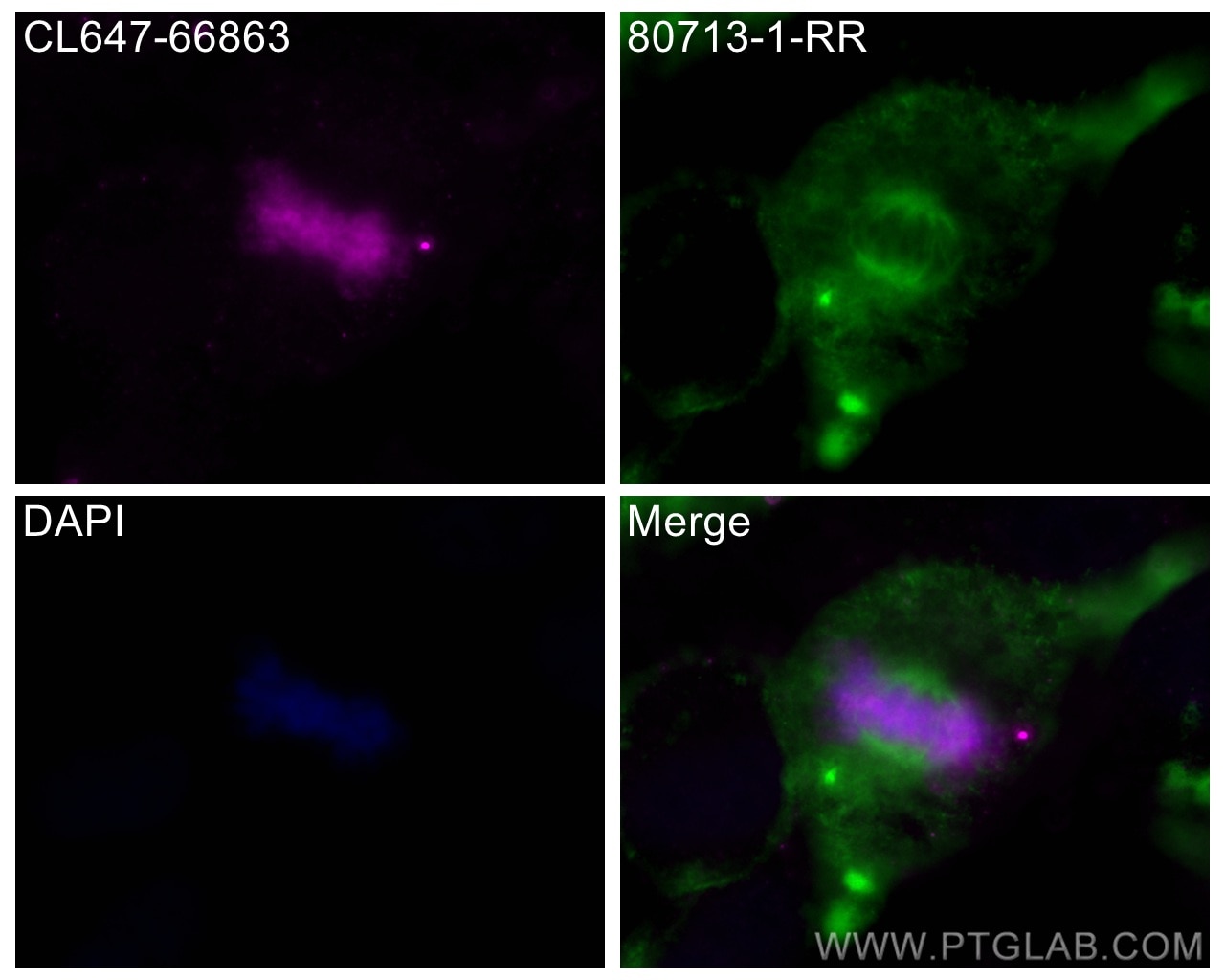Anticorps Monoclonal anti-Phospho-Histone H3 (Ser10)
Phospho-Histone H3 (Ser10) Monoclonal Antibody for IF/ICC
Hôte / Isotype
Mouse / IgG1
Réactivité testée
Humain, porc, rat, souris
Applications
IF/ICC
Conjugaison
CoraLite® Plus 647 Fluorescent Dye
CloneNo.
4C7G2
N° de cat : CL647-66863
Synonymes
Galerie de données de validation
Applications testées
| Résultats positifs en IF/ICC | cellules HeLa, |
Dilution recommandée
| Application | Dilution |
|---|---|
| Immunofluorescence (IF)/ICC | IF/ICC : 1:50-1:500 |
| It is recommended that this reagent should be titrated in each testing system to obtain optimal results. | |
| Sample-dependent, check data in validation data gallery | |
Informations sur le produit
CL647-66863 cible Phospho-Histone H3 (Ser10) dans les applications de IF/ICC et montre une réactivité avec des échantillons Humain, porc, rat, souris
| Réactivité | Humain, porc, rat, souris |
| Hôte / Isotype | Mouse / IgG1 |
| Clonalité | Monoclonal |
| Type | Anticorps |
| Immunogène | Peptide |
| Nom complet | histone cluster 1, H3a |
| Masse moléculaire calculée | 15 kDa |
| Poids moléculaire observé | 15-17 kDa |
| Numéro d’acquisition GenBank | NM_003529 |
| Symbole du gène | HIST1H3A |
| Identification du gène (NCBI) | 8350 |
| Conjugaison | CoraLite® Plus 647 Fluorescent Dye |
| Excitation/Emission maxima wavelengths | 654 nm / 674 nm |
| Forme | Liquide |
| Méthode de purification | Purification par protéine G |
| Tampon de stockage | PBS with 50% glycerol, 0.05% Proclin300, 0.5% BSA |
| Conditions de stockage | Stocker à -20 °C. Éviter toute exposition à la lumière. Stable pendant un an après l'expédition. L'aliquotage n'est pas nécessaire pour le stockage à -20oC Les 20ul contiennent 0,1% de BSA. |
Informations générales
Phospho-histone-H3 (PHH3) is a core histone protein, which in its phosphorylated state forms the principal constituents of eukaryotic chromatin, with histone H3 being phosphorylated at serine (Ser) 10 or Ser28 as well as its phosphorylation of Ser10 being strongly correlated with the late G2 to M-phase transition in mammalian mitotic cells. On the basis of previous research, a few cell line- and animal model-based researches have displayed an increase in phosphorylation of histone H3 at Ser10 (H3S10ph), the only histone marker that is involved in carcinogenesis and cellular transformation. Histone H3 phosphorylation on serine-10 is specific to mitosis and phosphorylated histone H3 (PHH3) proliferation markers (as counts defined per area or as indices defined per cell numbers) are increasingly being used to evaluate proliferation in various tumors.
Protocole
| Product Specific Protocols | |
|---|---|
| IF protocol for CL Plus 647 Phospho-Histone H3 (Ser10) antibody CL647-66863 | Download protocol |
| Standard Protocols | |
|---|---|
| Click here to view our Standard Protocols |


